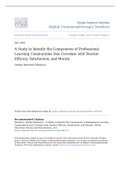Georgia Southern University Digital Commons@Georgia Southern Electronic Theses and Dissertations Graduate Studies, Jack N . Averitt College of Fall 2009 A Study to Identify the Components of Professional Learning Communities that Correlate with T eacher Efficacy , Satisfaction, and Morale Shirley Robinette W eathers Follow this and additional works at: https://digitalcommons.georgiasouthern.edu/etd Recommended Citation Weathers, Shirley Robinette, "A Study to Identify the Components of Professional Learning Communities that Correlate with T eacher Efficacy , Satisfaction, and Morale" (2009). Electronic Theses and Dissertations . 313. https://digitalcommons.georgiasouthern.edu/etd/313 This dissertation (open access) is brought to you for free and open access by the Graduate Studies, Jack N . Averitt College of at Digital Commons@Georgia Southern. It has been accepted for inclusion in Electronic Theses and Dissertations by an authorized administrator of Digital Commons@Georgia Southern. F or more information, please contact digitalcommons@georgiasouthern.edu . A STUDY TO IDENTIFY THE COMPONENTS OF PROFESSIONAL LEARNING COMMUNITIES THAT CORRELATE WITH TEACHER EFFICACY, SATISFACTION, AND MORALE by SHIRLEY ROBINETTE WEATHERS (Under the Direction of Charles Reavis) ABSTRACT This study was conducted to provide information con cerning the attributes of professional learning communities, i.e. supportive leadership, s hared values and vision, collective learning and application, supportive conditions-relational, supportive conditions-structural, and shared personal practice and their correlation with teache r efficacy, satisfaction, and morale. These six characteristics of learning communities were studie d to ascertain the association of those characteristics or attributes with teacher measures . The underlying premise for the study was that teachers who feel supported in their classroom prac tice are more committed and effective than those who do not. When teachers have a strong sense of efficacy, they tend to adopt new classroom behaviors and stay in the profession long er. Pearson Correlation analysis and regression analys is were performed on nine constructs to determine their associations. The three dependen t variables were teacher measures of efficacy, satisfaction, and morale. The independent variables were the six constructs of professional learning communities, i.e. supportive leadership, s hared values, collective learning, conditions-
relational, conditions-structural, and shared perso nal practice. The three control variables were teacher experience, teacher autonomy, and teacher s alary contentedness. 2 The results of Pearson Correlation analysis showed that all six constructs of PLCs were significantly related to teacher efficacy; four of the six constructs, i.e. supportive conditions-
structural, supportive conditions-relational, colle ctive learning, and shared values of PLCs were significantly related to teacher satisfaction; and, all six of the PLC attributes were significantly related to teacher morale. Regression analysis dete rmined that there were no significant relationships with teacher efficacy and professiona l learning community dimensions, one significant relationship with satisfaction and the PLC dimension of supportive conditions-
structural, two significant relationships with mora le and PLC dimensions of collective learning and supportive conditions-structural. INDEX WORDS: Professional Learning Communities, Tea cher Efficacy, Teacher Satisfaction, Teacher Autonomy, and Teacher Morale 3 A STUDY TO IDENTIFY THE COMPONENTS OF PROFESSIONAL LEARNING COMMUNITIES THAT CORRELATE WITH TEACHER EFFICACY, SATISFACTION, AND MORALE by SHIRLEY ROBINETTE WEATHERS B.A., Augusta College, 1975 B.A. Augusta College, 1978 M. Ed., Augusta State University, 2002 Ed. S., Augusta State University, 2003 A Dissertation Submitted to the Graduate Faculty of Georgia Southern University in Partial Fulfillment of the Requirements for the Deg ree DOCTOR OF EDUCATION STATESBORO, GEORGIA 2009




